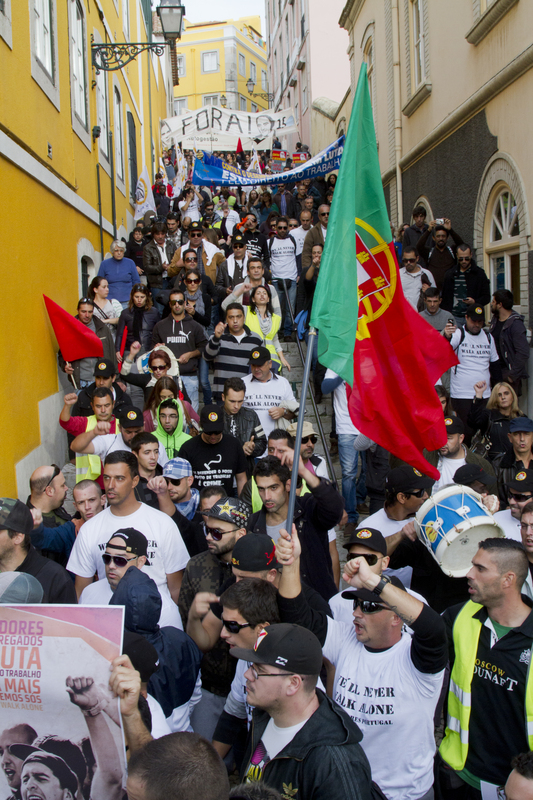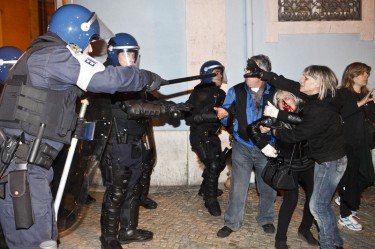This post is part of our coverage Europe in Crisis
The general strike of November 14, 2012, in Portugal, brought once again the crowds to the streets across the country, to take a stand against growing austerity. The real motivations for people to demonstrate however, have fallen away from mainstream media's attention due to “visually appealing” and unfortunate events: by the end of an intense day of peaceful marches and sit-ins, confrontations between police and protesters turned violence into the main top news.
This was the fourth general strike taking place in the country in the last two years, only this time the stoppage, called [pt] by one of the main labour unions (CGTP), was part of a transnational call for Southern European countries – the so-called PIGS (Portugal, Italy, Greece and Spain) – where citizens are being severely affected by the imposed austerity measures and the financial crisis.

Demonstrators walking towards the Assembleia da Republica in Sao Bento, Lisbon. Photo by Francois Bota copyright Demotix (14/11/2012)
Henrique Borralho, a Brazilian professor living in Lisbon, narrates [pt] how he ended up joining the demonstration in solidarity on his blog.
Walking throughout the capital, he had the opportunity to talk with strikers who presented their worries for the future. Two of them (from Italy and Spain) shared stories that are common to all of the Southern European countries: healthcare privatization, massive layoffs, cuts in welfare, salary decreases:
Essa crise revela a face mais sangrenta da crise capitalista européia. As conquistas históricas da classe trabalhadora foram e estão sendo suprimidas, o cognominado bem-estar social já não existe mais, a condição minima de igualdade social começa a ruir.
Existe um paradoxo nessa crise: o consumo de luxo aumentou, consequentemente, o foço [sic] entre ricos e pobres também. A taxa de desemprego em Portugal bateu a casa dos 15,8% . A taxa de pobreza já está em 19%. O governo já aprovou, falta ser votado no Congresso, o aumento de impostos para 2013, a votação será no dia 27 de novembro, além da aprovação de uma lei de incentivo fiscal para captação de empresas que queiram investir no país pagando apenas 10% de impostos.
This crisis reveals the bloodiest face of the European capitalist crisis. The historical achievements of the working class have been and are being suppressed, the so-called social welfare no longer exists, the minimum condition of social equality begins to crumble.
There is a paradox in this crisis: luxury consumption increased and therefore so has the gap between rich and poor. The unemployment rate in Portugal has hit 15.8%. The poverty rate is already at 19%. The government has already approved, and it remains to be voted on in Parliament, the tax increase for 2013, the vote will take place on November 27, in addition to passing a law of tax incentives for attracting businesses that want to invest in the country paying only 10% of taxes.
Then he describes how he lived through the “sad episode” of violence and repression that took place at the end of the day. Global Voices briefly reported that in another post.

In Porto thousands of people marched in a protest in the centre of the city. Photo by Pedro Ferreira copyright Demotix (14/11/2012)
Fallacies of violence
After the indiscriminate police charge in front of the Parliament, in response to stone throwing by a group of protesters, later at night dozens of arrests in a different area of the city were reported [pt]. On the blog 5 Dias there are several testimonies of “illegal detentions”, police violence, lack of accusations, and refusal to the right to a lawyer, to external calls, and using the toilet.

Police barrier in front of the Portuguese parlament at the chashes during the Portuguese general strike on November, 14 against the austerity measures. Photo by Pedro Nunes copyright Demotix (14/11/2012)
President Cavaco Silva condemned “the rampage that was provoked by a group of citizens” and “praised the professionalism of Portuguese police carrying its function of granting public order and combating violence in our democracy”. Many netizens and even mainstream media followed this discourse. However, first hand reports in the blogosphere show different perspectives. Amnesty International condemns [pt] the disproportionate and excessive use of force against demonstrators who were peacefully protesting in Lisbon and asks the Government to open an inquiry.

Police men point batons while a woman is bleeding from the nose during the chashes. Photo by Pedro Nunes copyright Demotix (14/11/2012)
“It is the violence of the blind measures that is generating this climate of despair”, believes journalist Sarah Adamopoulos, one of the peaceful strikers who was calling for calm among protesters and who later had to “run, trying not to fall and be crushed by the crowd in panic”. She ended up being beaten by the “police anger” too, as she describes [pt] on her blog, Um Redondo Vocábulo:
As mulheres choravam, chocadas com a violência dos rapazes da PSP. Também chorei, também me chocou a violência indiscriminada sobre as pessoas, as bastonadas ao calhas, preferencialmente nas pernas para fazer cair as pessoas e bater-lhes mais, mas chocou-me sobretudo a visão da força repressiva que este Governo está disposto a usar para tentar calar o povo – para fazer com que aceite sem espernear as suas políticas inaceitáveis.
Women were crying, shocked by the violence of the boys of PSP [Public Security Police]. I also cried, I was shocked too with the indiscriminate violence on people, the random beatings, preferably in the legs to make people fall and hit them more, but it shocked me especially the vision of repressive force that this government is willing to use to try to silence the people – to get their unacceptable policies accepted without a fight.
Sara Figueiredo Costa, a free-lance journalist and blogger at Cadeirão Voltaire, also described the events in the first person, originally published on Facebook, and then shared [pt] on the blog 5 Dias. For her “it is not acceptable to think that stones are a justification for riot police to indiscriminately sweep the Largo de São Bento, to chase people through the streets and to walk around hunting demonstrators at Cais do Sodre”:
nunca serão, coisas toleráveis numa democracia, sendo, pelo contrário, coisas que ajudam a definir a ausência de democracia.
[these] will never be tolerable things in a democracy, being, on the contrary, things that help define the absence of democracy.
She stresses that when “police obey orders, it doesn't decide on its own that it will charge at all the people, young or old, that come across their way”. Orders come from the Minister of Internal Administration, Miguel Macedo, whose statements after the events were questioned [pt] by the journalist Daniel Oliveira:
Quando a polícia espancou gente pacifica em vários locais da cidade, estava a garantir a ordem pública ou a contribuir para a desordem? Estava a garantir a integridade física dos cidadãos ou a pô-la em causa? Estava a garantir o cumprimento da lei ou a violá-la? Estava a reprimir os “profissionais da desordem” ou a espalhar a desordem pela cidade? O comportamento inaceitável de meia dúzia pode justificar um comportamento arbitrário das forças de segurança, que não poupa ninguém a quilómetros de distância da própria manifestação?
When police hit peaceful people in several places in the city, was it ensuring the public order or contributing to the disorder? Was it ensuring citizen's physical integrity or putting it at stake? Was it ensuring the writ of the law or violating it? Was it repressing the “professionals of disorder” or spreading disorder around town? Can the unacceptable behaviour of a handful of people, justify the random bahaviour of the security forces, who didn't spare any one, even those kilometres away from the demonstration itself?
And finally says that “yesterday's general strike was one of the biggest of our history. (…) And not even the indiscriminate violence that the Minister of Internal Administration ordered to be spread around half the city of Lisbon can overshadow it. On televisions, it was the brutality of one or the other that won. But the day of yesterday was a lot more than that: it was a proof of courage.”
This post is part of our coverage Europe in Crisis







2 comments